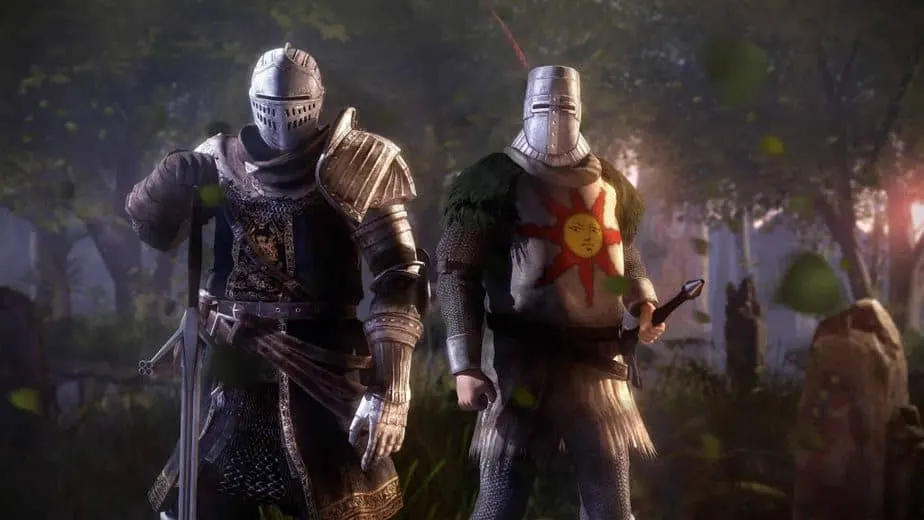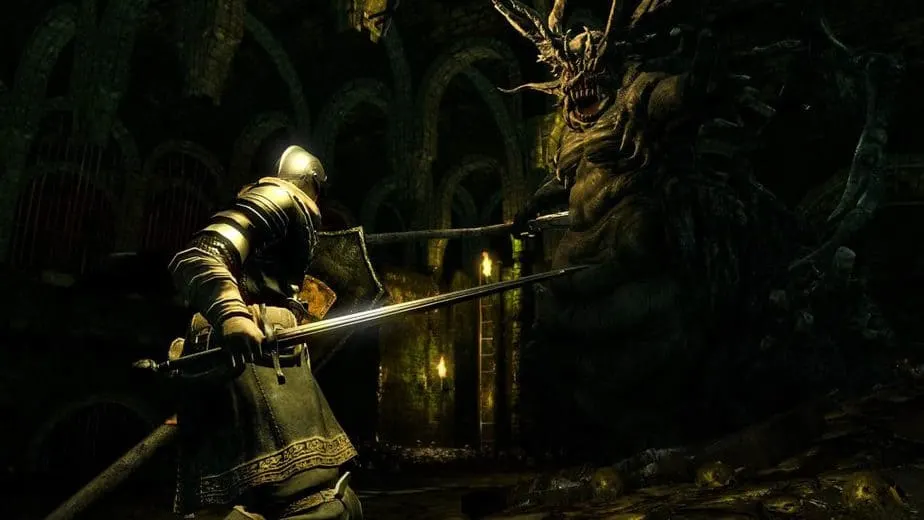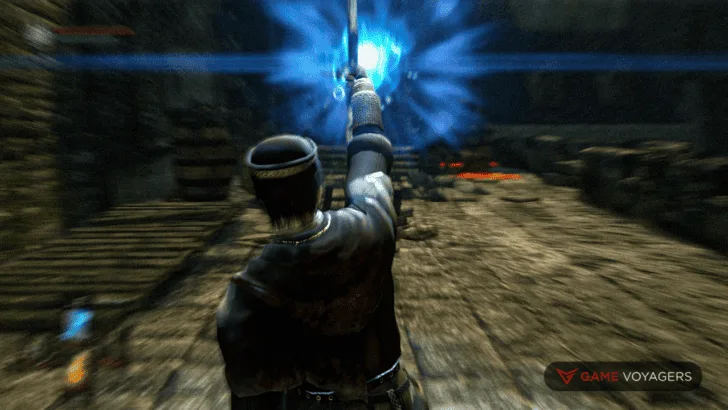Sorcerer is one of, if not the most played Dark Souls Remastered class amongst both new and veteran players alike. There’s a good reason for that, as the starting 15 Intelligence and 15 Attunement make it the hands-down best class option for any kind of spellcasting build.
It also has a lower starting Resistance stat to make up for its high Intelligence and Attunement. Given that Resistance is a useless stat in DS Remastered, the Sorcerer has the best starting stat distribution out of every single class.
Choosing to run a Sorcery build is a recommended choice for newer players to Dark Souls Remastered, and especially to those completely new to the SoulsBorne world.
Being able to output high damage from a distance, rather than having to time dodges and rolls up close, makes combat a lot more forgiving, and if we’re being honest, a lot easier.
That’s why we’ve put together this ultimate guide to Sorcerer in Darks Souls Remastered. We want to help newer players navigate this class so that they can get the most out of their time investment.
How to Get Started as a Sorcerer
Like all 10 starting classes in Dark Souls, you have the option of choosing Sorcerer as soon as you load up the game. It is one of your starting choices with absolutely no strings attached. You don’t have to do any busy-body work in order to use it.
Picking Sorcerer in Dark Souls Remastered is a plug-and-play job. You pick and you’re off. In fact, the only thing you’ll have to worry about at the start of the game when you’re picking your class is what gift to choose.
You get a choice of “gifts” at the start of the game. You can only pick one, so knowing what option bests suits your early-game plan in advance can help save you time during character creation.
The de-facto best starting gift in Dark Souls Remastered is the Master Key. This key lets you open certain doors and areas early, effectively bypassing portions of the game, or at least making them significantly easier to navigate.
To get the most out of the Master Key, you need to know what doors you’re looking for, so if this is your very first playthrough, you’re better off choosing something that will help you in combat like the Tiny Being’s Ring.
Effective Sorcerer Combat

Despite Sorcerery combat primarily focusing on ranged magic attacks, effective gameplay is going to involve a healthy mix of spellcasting and melee combat using a magic weapon.
For the very start of the game, you’re going to want to take advantage of your Soul Arrow starting Sorcery as much as possible. While the Sorcerer’s Catalyst that you start with isn’t particularly powerful, it does grant you a lot more versatility in combat when compared to your Dagger and Shield.
If you feel comfortable enough to take melee engagements early on, you can choose to use your Soul Arrow to weaken targets from a distance before you engage them with your melee attacks. This is the kind of gameplay that you’ll likely be using for most of your run unless you decide to go for a pure spellcasting build.
Most Sorcerer players prioritize damage, meaning they end up squishier than something like a Knight. However, this tradeoff allows Sorcerers to output insane damage numbers from both a distance and up close with something like a Moonlight Greatsword.
Therefore, effective Sorcerer combat is going to involve maximizing as much damage as you possibly can. In both PvE and PvP, you want fights to end as soon as possible so that enemies have less of a chance to hit you.
This is done by pumping your Intelligence upwards of 50 and utilizing upgraded Sorceries like the Crystal Soul Spear. Alternatively, you can use Crystal Magic Weapon to massively buff something like a Balder Side Sword if you want to take melee fights.
Deciding between the ranged and melee combat styles is a decision you’ll need to make early on. This won’t necessarily change how you build your Sorcerer all that much, but it does impact what weapons, equipment, and Sorceries you need to pick up throughout your playthrough.
You don’t need to feel pressured about this decision, though. You’ll always be able to switch things up mid-run if needs be, which isn’t something that can be said for most of the other classes in the game.
So, if you’re new to Sorcerer in Dark Souls Remastered, spend some time experimenting with both combat styles and see which you prefer. Once you decide, you can use one of our builds below to specialize in your style of choice.
Essential Steps
Deciding whether or not you want to play primarily ranged or melee is important, but it’s a decision that you can make later in a run as opposed to immediately. How you level will be the same either way.
- Regardless of your playstyle, you’ll want to get an Intelligence scaling weapon as soon as you can. This can be done by getting Rickert to upgrade an early game weapon like the Longsword with Green Titanite Shards. These Shards are dropped by the Giant Leeches in Blighttown.
- While you’re dealing with Ricket, purchase another set of Soul Arrows and equip them to help lighten the early-game load.
- Unlock Griggs of Vinheim and get upgraded Soul Arrows.
- Unlock Logan to get access to more powerful mid-late game Sorceries, as well as Logan’s Catalyst.
Scaling your Sorcerer build throughout your playthrough calls for a bit more work than other classes purely because you need to worry about your spells. You need to be upgrading them as well as acquiring new ones.
While you should hit all of the requirements as you run through the game, don’t be afraid to seek out additional help if you need it. This guide would be 10,000 words long if we were to include everything there was to playing through DSR as a Sorcerer, so get some guidance when you need it.
Everything from how to get access to Griggs of Vinheim all the way to actually unlocking Logan’s Catalyst requires a bunch of different steps and processes, so if you’re stuck, know that you’re not alone.
Best Sorcerer Builds
Before we dive into our two Sorcerer builds, we need to preface it by saying that almost all Sorcerer builds, regardless of playstyle, are nearly identical. With the exception of a handful of optimizations, the fundamental damage scaling is the same.
This means that both melee and ranged Sorcerers level the same stats to the same soft caps. This also means that you have a lot of versatility when it comes to swapping your build-up mid-game, so don’t feel pigeonholed into one playstyle.
If you don’t like how things are going halfway through your run, switch it up. You’ve already got the stat distribution for it, so there’s no penalty whatsoever if you decide that one Sorcerer combat style isn’t for you.
Melee/Range Hybrid Sorcerer
Attributes
- DEX – 40/45. It might seem odd to include Dexterity for a Sorcerer build. However, between the levels of 35 and 45, Dexterity actually increases the casting speed of your Sorceries. Needless to say, the faster you cast, the more damage you deal.
- INT – 44. We’re only leveling our Intelligence up to 44, but feel free to scale up to 50 if you want to squeeze as much damage as possible out of your build. Just make sure you don’t go past that softcap. We’ve gone with 44 because it provides really solid damage while also giving us access to Crystal Soul Spear.
- VIT – 40. Most Sorcery hybrid builds sacrifice Vitality in the name of more damage or endurance. We’re not doing that ourselves, but that’s not to say that you can’t. If you want to stick to a certain Soul Level, or you feel comfortable being less tanky, feel free to strip as many Vitality points as you need.
Aside from these three, we also recommend putting four points into Attunement to push it to 19 for an extra Sorcery slot and then dumping the rest of your points into Endurance. You can scale your Intelligence up to 50 if you want access to White Dragon Breath, but that’s the only reason to ever invest that many points into the stat.
Compared to pure sorcery builds, this hybrid build actually calls for a bit of foresight. Specifically, in how much Strenght you’re going to need. Yes, Strength. As a Hybrid build, you need to have the stat requirements needed to use your melee weapon of choice. For us, that’s the Moonlight Greatsword, meaning we need STR 16. Your melee weapon will scale with Intelligence, so this is strictly so that you can actually equip the weapon in the first place.
Equipment and Armor
As we mentioned previously, our Weapon of choice is the Moonlight Greatsword. Any experienced Sorcerery player will be able to tell you that it’s a staple of the class, but it’s far from your only option.
If you wanted to get technical about things, you could use a Longsword or Shortsword with Crystal Magic Weapon. This requires micromanagement in combat, but it’s actually possible to output more damage this way than simply using an Intelligence scaling weapon.
Ultimately, your weapon and equipment choice comes down to you. Armor doesn’t particularly matter, but you might want to put a bit of thought into your Ring choice. As for your weapons, play around with different swords and types of scaling to see what you feel comfortable with.
The only hard requirement we have for your equipment is using Logan’s Catalyst. At least, that’s mandatory for PvE. If you’re looking to focus on PvP, you can swap it out for a Catalyst that deals more damage like the Tin Crystallization Catalyst.
We’re considering it a must-use for PvE, however, because of how many spells charges it gives you while also maintaining great damage. Whereas the Tin Crystallization Catalyst halves your spell charges, Logan’s Catalyst will keep you fully stocked up on Sorcereies while hitting enemies like a truck, giving you great sustained damage for PvE encounters.
Sorceries
- Crystal Soul Spear.
- Optional: Crystal Magic Weapon.
Now we’re on to the fun stuff. After all, why are you playing Sorcerer if not for all the awesome spells you get access to?
Our use case for Sorceries with this hybrid build is giving us range damaged to soften up targets before we’re forced to engage them at close range. For that reason, our main Sorcery of choice is going to be Crystal Soul Spear.
This is a staple of most Sorcery builds in Dark Souls Remastered. It replaces your Soul Arrows as soon as possible, giving you much better damage against late-game enemies.
If you’re looking to diversify your Sorcery choice, you could also opt to use Homing Crystal Soulmass, granted that spell is much better in PvP than it is in PvE.
Alternatively, if you’re not using a magic scaling weapon, the Magic Crystal weapon is a must-have to get your sword of choice to scale with a magic adjustment while it’s active.
Pure Sorcerer

Attributes
- INT – 50. Most Sorcery players will tell you that leveling Intelligence past 45 is a waste. From a purely META standpoint, that’s true. It’s also boring. If we’re going to play a pure Sorcerer build, we might as well spend the five extra points to squeeze more damage out of our spells, as well as gain access to White Dragon Breath.
- VIT- 45. Vitality is, more or less, the only defensive option we have when it comes to leveling our Sorcerer, so we want to take advantage of it. We’re still not going to be as tanky as a Knight player, but this will help to absorb some extra damage.
- DEX – 45. As you can tell, this build is almost identical to our hybrid build except more optimized for Sorcery usage. There are around 10 Soul Levels in the difference because both are setting out to accomplish the same thing. The only real difference is in playstyle, hence why we’ve pushed DEX to 45 for the extra casting speed.
You’ll notice that no matter where you look, most Sorcery builds are fundamentally the same. They all call for between 41/50 Intelligence, 40/45 Vitality, and most include the extra Dexterity for casting speed, although some don’t. They also all range between 19 and 23 Attunement depending on how many spell slots you want. Our build is no different.
The only real change between builds is how much one decides to invest into Endurance. A 1.5/1 or 2/1 VIT to END ratio is considered fairly optimal, but your Sorceries don’t actually consume stamina, so we’ve left this stat up to your discretion.
It’s important to remember that our builds are frameworks, nothing more. The same can be said for any other builds you find. As long as you stick to the core fundamentals, you can mix and match as much as you want.
Equipment and Armor
Once again, we’re giving you the option of either Logan’s Catalyst or the Tin Crystallization Catalyst. While this choice was fairly black and white in our hybrid build, it’s less so here.
As a pure Sorcerer, our goal is to hit as hard as we possibly can. We’re advising you to use the Bellowing Dragoncrest Ring for that reason. It’s also why the Tin Crystallization Catalyst is such a tempting choice. While it does halve your spell count, it’s going to make every Soul Spear hit like a nuke.
Once you have this build up and running, experiment with both to see what you think for yourself. If you can comfortably finish fights and areas with the Tin Catalyst, then it’s the better option. If you find yourself running out of charges, switch to Logan’s.
While we’re not touching on melee combat at all, you’re going to have to account for it, especially if you plan to play PvP. So, just get yourself the Moonlight Greatsword and avoid complicating the whole ordeal.
Sorceries
- Crystal Soul Spear.
- Homing Crystal Soulmass.
- Great Heavy Soul Arrow.
We’re keeping things simple here with the Crystal Soul Spear. It’s the best Sorcery in the game and will be your primary damage-dealing weapon. Unlike our hybrid playstyle, though, we’re going all-in on Sorceries, so it’s wise to round out your damage-dealing capabilities with both Homing Crystal Soulmass and Great Heavy Soul Arrow.
The three of these Sorceries combined should be more than enough to deal with any enemies you end up facing in PvE. If not, your 50 Intelligence gives you access to White Dragon Breath which, along with the rest of your arsenal, will be enough.

